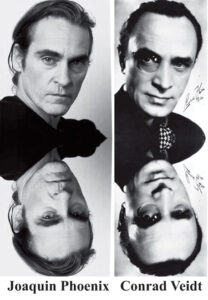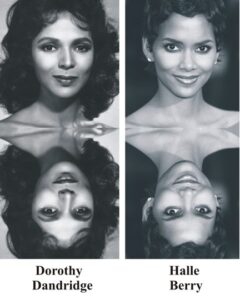Joaquin Phoenix as the Reincarnation of German Actor Conrad Veidt: “Jokers” in Two Lifetimes
- CATEGORY
 Proposed by: Nicole Arciola
Proposed by: Nicole Arciola
Affirmed by: Spirit Being Ahtun Re in a Ryerson-Semkiw Reincarnation Research Session
Article by: Walter Semkiw, MD
Click on images to enlarge
Conrad Veidt, the First Joker
In 2020, Joaquin Phoenix won the Oscar for his lead role in the movie Joker. It turns out that Joaquin played a similar role in his past life as Conrad Veidt.
Veidt was born in Berlin on January 22, 1893 to a Lutheran family. In 1914, he was drafted into the German Army during World War I.
A year later, in 1915, Veidt was sent to the Eastern Front and he fought in the Battle of Warsaw. Conrad then developed pneumonia with jaundice and he was sent to a hospital on the Baltic Sea. As his illness did not improve, Veidt was discharged from the German Army in 1917. Returning to Berlin, Conrad Veidt joined a theatre company to pursue a career in acting.
The Man Who Laughs and The DC Comics Joker
In 1928, Veidt starred in the silent movie, The Man Who Laughs, which is based on the novel of the same name, written by the French author Victor Hugo. Hugo also created Les Misérables and The Hunchback of Notre-Dame.
Hugo wrote The Man Who Laughs while exiled from France due to the political content of his prior books, which criticized French royalty and the behavior of the nobility.
Set in 17th century England, the plot involves a noble who refuses to kiss the hand of a tyrannical king, who then orders the execution of the noble and the surgical facial disfigurement of the noble’s son, Gwynplaine. The surgery results in Gwynplaine having a permanent, grotesque grin.
 Gwynplaine, still a boy, meets a carnival manager who is initially horrified by Gwynplaine’s appearance, but then takes pity on him and arranges for the boy to work in the carnival.
Gwynplaine, still a boy, meets a carnival manager who is initially horrified by Gwynplaine’s appearance, but then takes pity on him and arranges for the boy to work in the carnival.
In each town, Gwynplaine performs on stage with the lower part of his face hidden by a veil. After a period of time, he takes off the veil revealing his disfigured face, which provokes laughter in audience. In this way, Gwynplaine becomes a performance clown or joker.
In the movie, The Man Who Laughs, Conrad Veidt played the deformed Gwynplaine character, which later served as the inspiration for the DC Comics villain the Joker, who first appeared in a Batman comic book in 1942.
Conrad Veidt’s Activism Against the Nazis
Veidt was passionately opposed to the Nazi regime, which rose to power in 1933. The Nazis started purging the movie industry in Germany of Jews and anyone who opposed the Nazis and Hitler.
In 1933, Conrad Veidt married Ilona Prager, who was a Jew. A week after their ceremony, they relocated to Britain to avoid persecution by the Nazis. In England, Veidt continued his acting career.
A Move to Hollywood, A Donation to the War Effort and Casablanca
In 1941, Conrad and IIona moved to Hollywood to make films that would help get the isolationist United States into the war against Nazi Germany. Before he left England, Veidt donated his life savings to the British government to help finance the war effort.
His most famous role in an American film was that of Major Heinrich Strasser in the movie Casablanca, that featured Humphrey Bogart and which was made in 1942, before the United States entered World War II.
Veidt died in of a massive heart attack in 1943 while playing golf in Los Angeles. Joaquin Phoenix was born in 1974, 31 years after Conrad Veidt had died.
Activism: A Past Life Trait
 Another similarity between Conrad and Joaquin is that both have demonstrated passionate activism. Recall that Veidt gave all his savings to the British Government to help fund the WW II and that he later made movies designed to sway the United States into entering enter WW II.
Another similarity between Conrad and Joaquin is that both have demonstrated passionate activism. Recall that Veidt gave all his savings to the British Government to help fund the WW II and that he later made movies designed to sway the United States into entering enter WW II.
Joaquin Phoenix has supported Amnesty International, The Peace Alliance, veganism and animal rights. He has campaigned for In Defense of Animals (IDA) and People for the Ethical Treatment of Animals (PETA).
Replication of Career, Roles and Subject Matter in Reincarnation Cases
Reincarnation Research does show that talents and passions can be carried across from one lifetime to another. Replication of painting talent can even include replicating the subject matter from a past lifetime. Actors may replicate types of roles, such as in the Conrad Veidt | | Joaquin Phoenix case. Actors may even take roles involving their own past life, such as in the Halle Berry case. To learn more, please go to:
Paul Gaugin | Peter Teekamp Reincarnation Case
Dorothy Dandridge | Halle Berry Reincarnation Case
Frida Kahlo | Salma Hayek Reincarnation Case
Evidence and Principles of Reincarnation-Understanding Past Lives
 Physical Resemblance in Reincarnation Cases: There is a somewhat uncanny resemblance between Conrad and Joaquin.
Physical Resemblance in Reincarnation Cases: There is a somewhat uncanny resemblance between Conrad and Joaquin.
Past Life Passions, Talent and Abilities: Conrad and Joaquin both have had careers in acting and both have demonstrated activism.
Change of Religion and Nationality: Conrad Veidt was born in Germany to a Christian family while Joaquin Phoenix identifies himself as a Jew, as is his mother Arlyn. Joaquin was born in Puerto Rico to American parents and was raised in California.
Understanding that religion and nationality can change from one lifetime to another can help create a more peaceful world, as most conflicts and wars are based on differences in these cultural markers of identity. Important cases in this regard include:
Reincarnation Case of Anne Frank | Barbro Karlen: Change of Religion from Jewish to Christian
Reincarnation Case of Mushir Ali | Naresh Kumar: Change in Religion from Islamic to Hindu